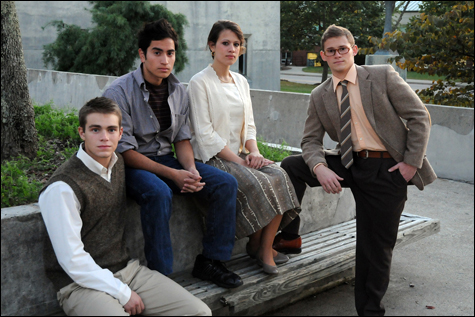
NOT WORLD-WEARY Andrew Burnap, Juarez, Hillary Scofield, and Cory Crew. |
Interracial harmony, good. Racism, bad. One-to-one, honest communication between people with differences is healthy and necessary.
A cursory take on Rebecca Gilman’s Spinning Into Butter could arguably dismiss its messages as being that superficial. The widely staged and well-respected play undoubtedly has a leg up on appreciation from being well-intended. But the production at URI Theatre (through October 24) eventually gets past such knee-jerk reactions. By the end, with considerable help from Gilman, even good intentions get taken to task.
First staged in 1999, the time of the play is specified as “Fall Semester 2005” by director Bryna Wortman, to emphasize that the sentiments expressed here have no expiration date. The place is fictional Belmont College in Vermont, a typical representation of East Coast liberalism.
We immediately plunge into the issues as the play opens. Student Patrick Chibas (Frank Juarez) is explaining why he marked “Other” on his college application. Dean of Students Sarah Daniels (Hillary Scofield) wants him to be specific because she wants to get him a $12,000 minority scholarship. He says he’s Nuyorican, but she suggests something like His-panic or Latino so she won’t have to explain the designation. Patrick reluctantly settles for Puerto Rican, even though he was born in New York.
The scene is worth detailing because it’s a capsule version of the social vision of the play as a whole: the white person’s sincere concern; the minority student’s (sorry, he insists on “student of color”) hypersensitivity about racial identity and identity politics; the miscommunications and misunderstandings; and so on.
Sarah’s sounding board is Ross Collins (Cory Crew), an art history professor who is breaking up with her to return to his default girlfriend. She soon has plenty more to be con-cerned about, because an African-American student named Simon Brick, whom we never see, is getting hate messages on his dormitory room door.
Two more administration people step into the fray. Another dean, Sarah’s superior Catherine Kenney (Stephanie Rodger), is angry for public relations reasons that Sarah reported the initial incident to the police. The chair of the humanities department, Burton Strauss (Miles Boucher), is a blowhard who inserts his long-winded opinions whenever allowed. A security guard, Mr. Myers (T.S. McCormick), is in the story to provide Sarah with commonsensical observations not readily available in rarefied academia. Finally, there is senior Greg Sullivan (Andrew Burnap), who wants to form a Students for Tolerance group in response to the incident. He also wants to call himself president, because it will look good on his law school application.
More than most college productions, Spinning Into Butter is handicapped by student-aged actors. Gilman specifies every character’s age or age range in the script, apparently con-cerned about generational impediments to communication. Sarah, for example, is 35-40, while Dean Kenney, her imperious boss, is 60. The actors here are too young to come across as world-weary when required, no matter how earnest. Nevertheless, Meek and Wozniak, as central characters Sarah and Ross, remain emotionally convincing throughout. By the time Meek is delivering a lengthy last-act monologue, breaking down the structure of white-guilt racial responses with accompanying confessional examples, we’re capti-vated.